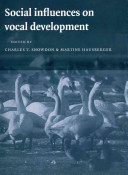
Social Influences on Vocal Development
By - Snowdon, Charles T.; , Hausberger, Martine
Floor
-
Floor 2
Published
-
Cambridge University Press, New York, 1997
ISBN 10 - 0521017971
ISBN 13 - 9780521017978
Book Status
-
1 Qnty Available with us.
Subject
-
Animal Communication
Shelf No
-
5
Call Number
-
591.59 SOC
Physical Description
-
ix, 352 pages : illustrations ; 25 cm
Notes
-
Includes index